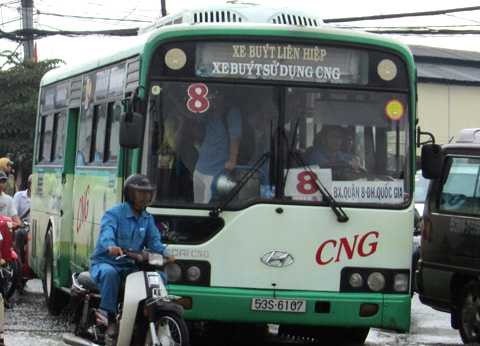 Society
Society

A HCM City programme to introduce new compressed natural gas (CNG) buses is facing difficulties due to a lack of financial support from the city and poor infrastructure.
 |
| A CNG bus in HCM City. A city programme to introduce a large new fleet of these eco-friendly buses has been hindered due to various reasons. — VNS File Photo. |
HCM CITY — A HCM City programme to introduce new compressed natural gas (CNG) buses is facing difficulties due to a lack of financial support from the city and poor infrastructure.
The programme envisaged that, starting in 2014, the city would have 1,680 new buses, most of them running on CNG. But few bus operators and co-operatives have launched these new environment-friendly buses.
According to a transport firm, the purchase and maintenance costs of CNG buses are too high compared to diesel-run buses, while the two types receive the same level of State financial support.
According to Phùng Đăng Hải, chairman of the HCM City Transportation Coop, a CNG bus costs VNĐ2.2-2.75 billion (US$96,000-120,000), nearly double that of a diesel bus. Maintenance costs are also more expensive.
Besides, there are only four CNG filling stations in the city (in Thủ Đức, Tân Bình, Bình Chánh, and District 12), resulting in more operational costs for these buses.
Nguyễn Văn Thảo, chairman of Transportation Coop No 15, said transport operators would pay 30 per cent of the cost of a bus and obtain bank loans for the remaining 70 per cent with interest rates subsidised by the city.
But they would face difficulties in even paying their share of 3 per cent interest on the loans since revenues from these buses are not high.
Efforts made to accelerate programme
According to the municipal transport department, the programme to introduce 1,680 new buses has been hindered by multiple obstacles, including setbacks in building CNG filling stations, affecting the development of the CNG bus routes.
The progress has also been hit by the delay in the provision of financial supports to bus operators despite the department’s efforts to ease loan procedures.
A spokesman for the department said it had also urged the State-owned oil group (PetroVietnam) to speed up construction of CNG filling stations and make efforts to stabilise the prices of CNG supplied to public transport companies in the city.
City authorities have also approved subsidies for the programme and urged relevant agencies to quickly disburse the money for buying the 1,680 new buses.
Trần Chí Trung, director of the department’s Public Transportation Management Centre, said the city was willing to spend more on CNG buses because they were eco-friendly.
Trần Quốc Toản, general director of the Sài Gòn Transportation Mechanical Corp, producer of CNG buses for the city, said the company also planned to provide a number of electric buses for the city.
Toản also said the locations of CNG filling stations in HCM City were very important and the city had identified 19 possible locations for them.
In addition to the four existing filling stations, five more were planned to be set up.
Trung said the city had urged CNG suppliers to speed up the construction progress. — VNS




